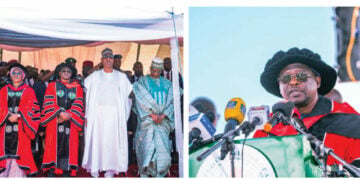The federal government has sought the support and cooperation of the international community over the threat of military intervention by the United States President, Donald Trump, following the U.S. listing of Nigeria as a Country of Particular Concern (CPC) on the alleged genocide against Christians in the country.
President Trump had, in a tweet, threatened to mobilise the U.S. military to dismantle the Boko Haram terrorists and their allies operating in Nigeria, whom he accused of perpetrating genocide and other forms of atrocities against Christians in Nigeria, which sparked widespread reactions.
Minister of Foreign Affairs, Ambassador Yusuf Tuggar, sought this international support while addressing members of the Diplomatic Corps on Wednesday in Abuja.
He expressed Nigeria’s concern over what he called the “unfounded and disparaging rhetoric” regarding the security situation in Nigeria.
He urged the envoys to follow the path of mutual respect and cooperation that foster peace, prosperity, and harmony.
The minister, represented by the Permanent Secretary, Dunoma Ahmed, noted that while Nigeria continues to face multifaceted security challenges, its democratic resilience, interfaith harmony, and socio-economic recovery remain evident under the President Bola Tinubu administration.
He said, “Recent external claims suggesting systemic religious persecution in Nigeria are unfounded. The recent designation of Nigeria as a Country of Particular Concern based on speculations of religious persecution is fundamentally misinformed. It misrepresents Nigeria’s secular constitutional order and its record in protecting religious freedom.
“Nigeria remains a global exemplar of religious plurality and democratic endurance. The 1999 Constitution guarantees complete freedom of thought, conscience, and religion and prohibits the adoption of any state religion. The Nigerian state is secular in both structure and function; policies and institutions operate without religious bias, ensuring that Christians and Muslims hold leadership positions at all levels.”
He added that Nigeria’s demographic balance, with approximately equal Christian and Muslim populations, its interwoven communities, and its functioning multi-religious democracy, stands as clear evidence of its peaceful coexistence.
He pointed out that although Nigeria faces security challenges, the Tinubu government has made enormous efforts in tackling the scourge in multiple ways.
On the issue of the implementation of Sharia and its blasphemy component in Nigeria, the minister said, “Nigeria’s national framework contains no offence of blasphemy. The existing public order laws are religion-neutral and protect all communities equally from incitement to violence.
“Sharia laws limited to some northern states apply only to Muslims and remain under the oversight of the secular judiciary. Christian and Muslim institutions operate freely, promoting peaceful coexistence. Interfaith harmony is sustained through institutions such as the Nigerian Inter-Religious Council (NIREC), the Christian Association of Nigeria (CAN), and the Nigerian Supreme Council for Islamic Affairs (NSCIA).”





